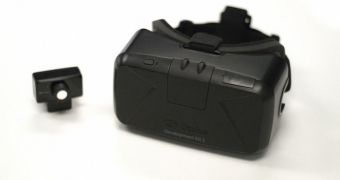The Oculus Rift virtual reality device might be laying the foundation for a future revolution in the video games industry, and the team in charge of it says that working with both Epic Games and Unity has allowed them to improve the capabilities of the device in interesting ways.
Michael Antonov, the chief software architect, is quoted by Gamasutra as saying that “with the latest Unreal Engine 4 release, Epic has actually integrated the Oculus SDK into the main codebase so that it works out of the box. They’ve also collaborated super closely with us on the core integration, major improvements and feature additions, QA, developer support, and even new samples and demos that ship alongside the engine.”
Epic Games plans to support Oculus Rift with its Unreal Engine 4 technology, and it seems that it will integrate the virtual reality experience into its future titles.
The fact that Unity is also involved in the development of the technology means that, in the near future, smaller projects that use the software might also natively support VR.
Antonov adds, “The engine integration work has a profound impact on the SDK. On more than one occasion, we’ve modified the API and implementation to account for different engine aspects related to stereo rendering, multithreading, and state management. These changes have made the overall SDK more robust for integration into the hundreds of proprietary engines around the industry.”
At the moment, the Oculus Rift DK2 package is being delivered to developers who have ordered it, and it will open up new options, including the ability to deliver images directly to the device rather than to treat it as part of the desktop.
The virtual reality device is at the moment only officially accessible to game creators, but plenty of fans have also picked up the special kit in order to see what the tech has to offer.
A full consumer version, which at the moment does not have a price tag, should be out before the end of the year, although it might be delayed if the company continues to focus on improving the experience for developers.
The device can be exclusively used on the PC, and Valve has said that it will work to make it a part of the upcoming ecosystem based around its SteamOS.
Virtual reality will also come to the PlayStation 4 via the Project Morpheus, which at the moment is in prototype stage at Sony.

 14 DAY TRIAL //
14 DAY TRIAL //